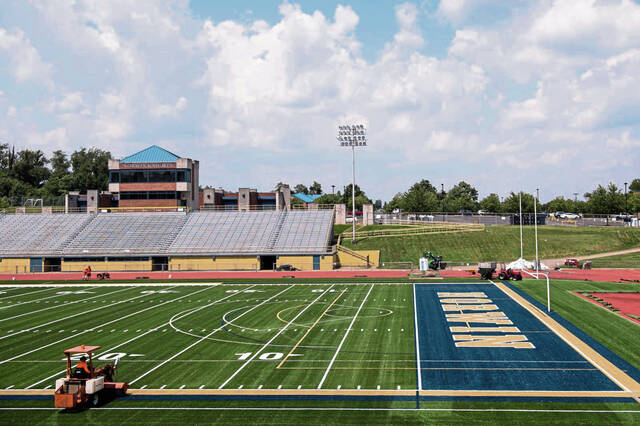https://triblive.com/opinion/editorial-what-does-selling-naming-rights-buy-a-school/
Editorial: What does selling naming rights buy a school?

If there’s one thing public schools understand, it’s how to apply math to a word problem.
“Jimmy has five apples” and “a train leaves Philadelphia heading east at 30 miles per hour” are the kind of things that show up in homework, teaching kids that math problems don’t just come with pluses and minuses. They reflect real-world issues.
School districts deal with these real problems in terms of the demands of buildings and facilities versus the limitations of funding. Renovations are expensive, especially as prices climb. Budgets are trampoline-tight, and no one wants to ask taxpayers to pony up more money.
Norwin School District knows this. The district is facing a $25.4 million stadium renovation. That’s a big check to ask voters to write, which is why the district is looking to ease the burden by selling naming rights.
At first blush, it’s a good idea. If the district can get a company to cover even a portion of the cost, why wouldn’t that be the way to go?
The pros do it all the time. Acrisure Stadium, PPG Paints Arena, PNC Park, etc. The venues get money to offset their operations while the companies get prominent publicity.
It’s not like Norwin would be the first in the area to go this route. Canon-McMillan plays on AHN Field thanks to Allegheny Health Network, while Armstrong High School has a relationship with NexTier Bank. There might not be a Heinz Field on the North Shore of Pittsburgh anymore, but there is in Aliquippa.
But this isn’t like selling candy bars or hoagies. This kind of fundraising is complicated and nuanced.
Taking large sums of money and putting a name on a building can give corporate entities or large donors a new kind of seat at the table — in theory if not statutorily. It might not buy a vote or any explicit authority, but it does imply a kind of influence, or the perception thereof.
As an example, when Norwin Superintendent Natalie McCracken says the district “would want to talk with (sponsors) about what their individual goals are,” it could raise questions that go far beyond fundraising.
What goals are OK? What aren’t? Who decides where that line is? Does the goal change with the dollar amount? If naming rights last the “life of the stadium,” is the school indentured to those goals forever?
These aren’t new ideas. Many districts have grappled with smaller versions for years. There might be an exclusive soda contract. A company might sponsor athletic uniforms. There could be a name on the scoreboard. But those give-and-take situations often have very specific parameters for money, length of time and expectations.
A school building or football field, on the other hand, is as much about identity as it is about its function.
These facilities are not billboards. They are not shopping centers where the names on the sign change as retailers come and go. Some companies may embrace that community connection. Another may not. Opening this door could be a Pandora’s box for a district.
School districts need to remember that saving money isn’t the only consideration. There’s also an obligation to preserve the reputation and autonomy of the organization. Saving money today might not matter if it sells off the future.
That doesn’t mean naming rights should be off the table. They just need to be pursued thoughtfully and with an eye toward the final answer — just like a math problem.
Copyright ©2026— Trib Total Media, LLC (TribLIVE.com)
